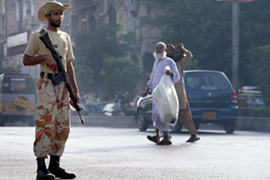Ominous signs for US-Pakistan ties
The Faisal Shahzad affair and US handling of it will ‘turn out badly’, says Robert Grenier.

 |
| Faisal Shahzad, a naturalised Pakistan-born US citizen, has been charged with planting a bomb in New York’s Times Square [EPA] |
This is going to turn out badly.
I have watched with some surprise, and with growing concern, the reactions of Americans to the string of revelations concerning the Pakistani links of Faisal Shahzad, the alleged would-be car bomber of Times Square.
It appears that Shahzad was progressively radicalised during the course of several trips to the land of his birth.
He is considered by many to be a case of home-grown terrorism: A US resident – indeed, a citizen – who was motivated to strike innocent civilians in his adopted country, apparently out of concern for attacks against Muslims abroad.
In this, he joins a growing list of such actual or aspirational terrorists in the US, among whom Major Hassan Nidal, the army officer who killed 13 fellow soldiers at Fort Hood, Texas, and Najibullah Zazi, the Afghan-born permanent resident alien who recently pleaded guilty to attempting to bomb the New York subway, are but the most recent and worrisome examples.
Time to reconsider
 |
| Shahzad apparently claims to have had support from the Pakistani Taliban [EPA] |
However, Shahzad also apparently claims to have had encouragement and support, including bomb training, from the so-called Tehrik-i Taliban Pakistan – the Pakistani Taliban, or TTP.
To most Americans, this is a new and unwelcome twist. Attacks by al-Qaeda they fear, but understand.
The fact that we are at war in Afghanistan with the Taliban is well-known. But to find now that the US is apparently under some form of attack from a rag-tag group of Pakistani extremists of whom most Americans had not heard two weeks ago is even more unsettling.
The fact that even well-informed Americans, including many in government, wonder why we should be targeted by the TTP is, to me, a source of wonder. What did they think?
Beitullah Mehsud, the 2007 founder of the TTP, was killed in an apparent US missile strike in 2009.
His successor, Hakimullah Mehsud, was apparently also the victim of two missile strikes this year, the second of which was thought to have killed him – until he recently popped back up.
Beitullah distinguished himself by making appeals not as a local militant with strictly parochial concerns, but as a member of a regional and global movement of which he considered himself and his organisation to be an integral part.
To those in the US who knew of Beitullah’s threat to strike the White House, or to hit targets in the UK, such boasts were largely ridiculed. But in a technically wired world in which people, things and ideas move so freely, the ridiculers should stop to reconsider.
The TTP, until now, has been considered primarily a threat to the government of Pakistan.
Pakistani opposition to the TTP, in turn, has been unequivocal for nearly a year.
Indeed, the Pakistan army’s invasion of South Waziristan late last year was aimed at the Mehsuds and the core of the TTP, to which the TTP has responded with a horrific string of mass-casualty attacks, largely against civilians.
Given that history, the clear commitment of the Pakistanis to counter the TTP (if not other groups), and the scale of Pakistani suffering at TTP hands, one might have expected this possibly TTP-abetted attempt on the US to reinforce the sense of solidarity between the two partner countries.
That was hardly the case.
Heightened suspicions
| IN depth | |||||||||||||||||||||||||
|
Instead, the Shahzad affair has heightened US suspicion of both Pakistani motives and Pakistani resolve in resisting extremism and militancy.
Pakistani policy toward militant groups of various stripes is far too complicated, far too ambiguous, and far too finely calibrated to ever gain clear US support.
Pakistani willingness to tolerate on its territory Afghan insurgent groups through whom it might hope to exert influence in that country has gained a certain measure of grudging, sullen tolerance from US officials, but will never find real US acceptance.
Pakistan’s reluctance to move too aggressively against its many current and potential enemies at once – particularly in North Waziristan – while at times understandable to official American eyes, will always generate the nagging suspicion that at any given moment, Pakistan can, and should do more.
The US attitude was most bluntly expressed by the secretary of state herself.
Speaking this past weekend on the 60 Minutes television show, Hillary Clinton praised Pakistani progress in fighting extremism, but added this, referring to the Times Square incident: “If, heaven forbid, an attack like this, that we can trace back to Pakistan, were to have been successful, there would be very severe consequences.”
Asked to elaborate – and given the chance to moderate her statement – she declined.
Breeding resentment
 |
| The Shahzad affair has heightened distrust of Pakistan’s resolve to tackle terrorism [EPA] |
The US administration’s attitude could not be clearer: Whatever the current degree of US engagement with Pakistan, no matter the level of US financial support, regardless of US proclamations that it wants a long-term strategic partnership with Pakistan, US-Pakistani relations cannot withstand a significant terrorist attack on the US homeland if it should emanate from Pakistani soil.
It should be recognised and acknowledged, however, that it is not a matter of whether, but of when there will be another significant terrorist attack in the US
And if, God forbid, it involves some link to Pakistan, as well it might, there will be hell to pay.
The open question is: Just what would the US do?
The Times Square incident has already begun to generate the usual pressures for expanded drone attacks in Pakistan, and even for consideration of a direct US military presence.
But it is not like drone attacks, if they are targeted and discriminating, as they must be, can simply be dialed up a few notches at will.
And even the most willfully aggressive US military and government officials will understand, on even a moment’s informed reflection, that a cross-border US combat military presence in Pakistan would be disastrously counter-productive.
Given Pakistan’s growing reliance on US financial support, both direct and indirect through international institutions, though, it seems likely that the US would react to a terrorist attack with crude threats of a financial cut-off, reverting to the coercive tactics of the past and abandoning its stated attempt to get beyond the “transactional” dynamic of its past relations with Pakistan.
Such attempts at gaining “leverage” are more likely to generate resentment than renewed commitment on the part of Pakistan.
Ticking clock
Meanwhile the US-Nato coalition project in Afghanistan is not going well.
In the end, whatever the efforts of the coalition and the Afghan government, “victory” will ultimately depend on the willingness of Afghans in the Pushtun areas to resist voluntarily both the blandishments and the threats of the Taliban.
They are unlikely to do so consistently. And the Afghan government, for its part, will not develop the capacity to enforce its writ unilaterally in the Pushtun areas on any timeline politically acceptable in the US – and most likely never will, despite high levels of US support.
Moreover, so long as the US maintains a substantial military presence in Afghanistan, the number of its enemies – the number of “accidental guerillas,” as David Kilcullen would say – across the Durand Line in Pakistan will continue to increase, irrespective of broad popular support for resistance to militants who directly threaten Pakistan.
The motivation of those hunted by the US to strike back at their tormentors is also likely to grow commensurately.
All the while, the clock continues to tick down on the next US terror attack.
When one puts it all together, it is hard to see how this can turn out well.
Robert Grenier was the CIA’s chief of station in Islamabad, Pakistan, from 1999 to 2002. He was also the director of CIA’s counter-terrorism centre.
The views expressed in this article are the author’s own and do not necessarily reflect Al Jazeera’s editorial policy.